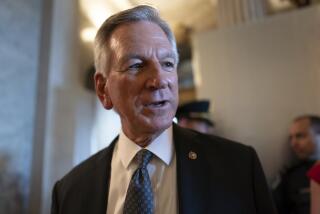Senate Votes Itself $23,200 Raise While Banning Honorariums
WASHINGTON — In a surprise move, the Senate Wednesday night voted itself a raise in pay to $125,100 a year, the same level as that enjoyed by members of the House.
The $23,200 yearly increase, however, will mean that much-criticized speaking fees from special interest groups will be banned. As part of the package, the Senate also imposed a ceiling of $18,675 a year on outside earned income.
The vote was 53 to 45. California’s senators split on the issue. Democrat Alan Cranston, who is retiring after this term, voted for the raise. Republican John Seymour, who plans to seek reelection next year, voted against it.
Anticipating an adverse public reaction, leaders of both parties joined in sponsoring the pay increase. Defenders said that it was a move for good government because it simultaneously bars senators from taking about $23,000 in honorariums each year.
Opposing the raise, Sen. Charles E. Grassley (R-Iowa) said: “We should raise salaries only after we show we can manage the government effectively . . . after we balance the federal budget.”
Sen. J. Bennett Johnston (D-La.) echoed a common fear among his colleagues when he said: “I know senators are scared to death of 30-second television spots. . . . I know I am.” But Johnston pleaded for passage of the raise anyway.
Sponsors of the raise contended that it was wrong for the Senate to have a lower salary than the federal judiciary, the top level of executive branch officials and the House, which began enjoying a raise to $125,100 on Jan. 1.
“It is not a pay raise,” insisted Sen. Ted Stevens (R-Alaska). “It is a pay equalization concept. Those who vote against this measure, I suggest they get a hotel room downtown. I think most (senators’) wives would vote for this amendment.”
Referring to previous salary increases for the House, federal judges and executive branch officials, Sen. Robert C. Byrd (D-W.Va.) said: “The Senate is the only institution in the federal government . . . that has not received a comparable pay adjustment.”
The ban on honorariums reflects growing public disapproval of senators’ acceptance of up to $2,000 for speeches to special interest groups. While the Senate has voted previously to ban honorariums, it never has enacted the ban into law. Byrd predicted that this time the ban will become law.
The pay package is an amendment to the $2.3-billion appropriations bill for the legislative branch and related institutions--a bill that President Bush is certain to sign.
Under present law, senators may accept a total of $23,000 in honorariums and there is no limit on outside earned income.
A total of 28 Democrats and 25 Republicans voted for the pay raise and honorariums ban while 27 Democrats and 18 Republicans opposed it. In one sign of the political apprehension that the proposal created, 26 senators facing reelection next year voted against the package while only seven who are expected to face the voters in 1992 voted for it.
Staff writer Paul Houston contributed to this story.
More to Read
Get the L.A. Times Politics newsletter
Deeply reported insights into legislation, politics and policy from Sacramento, Washington and beyond. In your inbox three times per week.
You may occasionally receive promotional content from the Los Angeles Times.










